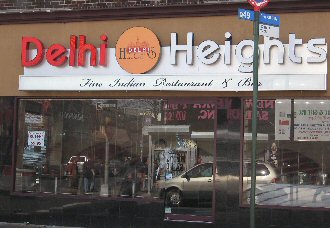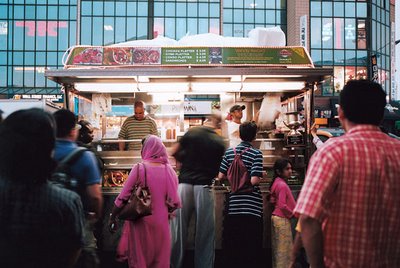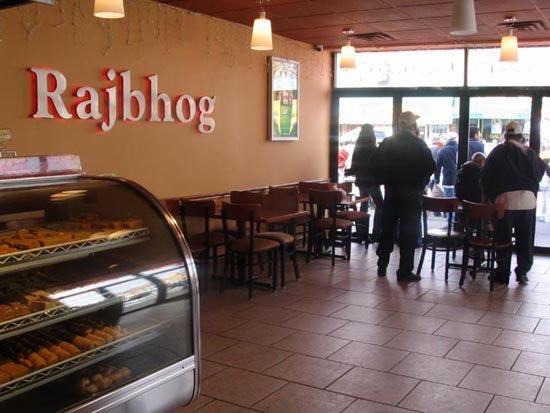From The Peopling of New York City
The Financial Model of Restaurants
The proliferation of restaurants in ethnic communities is often a curious thing: how do all these businesses that offer the same product survive in the same area? It goes against the Western model of business: similar products should be paced throughout locations. McDonald's and Burger King rarely occupy the same block, let alone a 3 block radius. Even in malls, where it would be understandable for two restaurants to occupy the same Food Court, there is a distinct variety of food - one restaurant, one type of food.
Yet in ethnic business areas like Jackson Heights, there is a grouping of food from the same area: South and Southeast Asia. All the restaurants there offer similar types of cuisine, yet they still get enough profit to continue opening. Through analysis of the decisions that created this pattern, it is possible to see how these restaurants succeed.
A video of the many ethnic businesses and restaurants in Jackson Heights
Starting a Business
Restaurants are a popular form of business for new entrepreneurs to start up. The restaurant owners in Jackson Heights often use their business as a primary source of income, and many are still involved with the daily maintenance. However, as restaurants get older, managers are often used. For instance, Nirav Shah and Eugene D' Costa are the managers of the Rajbhog and New Delhi Restaurant, respectively. Rajbhog and New Delhi Restaurant have both been around since the 1970s, meaning they have been profitable enough to pay for a manager.
Backgrounds of Owners
"Q: What type of workers do you hire for the restaurant? A: Family. All kinds of people, mostly through connections. Family doesn’t complain."
-Interview with workers at Khan Buffet Restaurant
Starting a business is a common immigrant strategy to gain income. Employees are usually hired from family or connections because they are trustworthy and cheap. There are some exceptional reasons for starting a business, however. Nirav Shah of Rajbhog restaurant told me that the reason his uncle started the business was that he wanted something for Shah's aunt to do. The uncle worked as an engineer, while his wife spent most of her time at home. Since the aunt was a proficient cook, the uncle decided to create a restaurant that made traditional authentic Indian sweets because people of all ages could enjoy such a treat.
Advertising
The restaurants in Jackson Heights use small ads in the Indian newspaper, if they advertise at all. The single exception is the Jackson Diner, one of the oldest South Asian restaurants in the area. Most restaurants use word of mouth as the way to publicize. However, their biggest advertisement is being in Jackson Heights. The neighborhood is reputed as a South Asian business area; a lot of people go there to eat South Asian food. The variety of the stores there attracts South Asian shoppers, many of whom come as family groups and end up a day of shopping with a family meal. This is one reason why these similar restaurants clump together - by clumping together, they create reputation and attention to their area. In fact, the reason cited by almost every single restaurant owner why Jackson Heights was the location of their store was that it was where all the South Asian people went. However, as the area gets more attention and gets older, different people will start visiting. Now, when someone walks through the Jackson Heights shopping area, she would see different types of people including Caucasians, East Asians, and Hispanics along with the predominate South Asian population.
A video clip advertising the popular buffet Jackson Diner
The Changing of Menus
"Yes, we’ve added many different kinds of foods and taken away many. When people change, we have to find out what foods they like and what they don’t...Around once a year, we will decide to try a new recipe or take out a not so popular food and if our customers like it, we will keep it."
-Eugene D. Costa, manager of New Delhi Restaurant
As an ethnic business area gets older, changes need to be made to the original business model. Restaurants are no exception; they often have to change their food in order to attract new customers or to compete with new businesses nearby. As different types of people filter in to Jackson Heights, such as the Bangladeshis in the 1990s, and the Tibetans more recently, restaurant food starts to change. A newer generation of immigrants, now reaching adulthood, is often is more Americanized, and adopts more American ideas about food and eating. Therefore, they want a lot of food fast, for not very much money. Area restaurants have found that the best way to do this is through buffets - therefore, the Jackson Diner, the New Delhi Palace, the Khan Baba Buffet, and other similar restaurants offer popular buffets in addition to a la carte menus.
Decisions For the Future
"Well, we’re always looking to expand, but with the economy we might have to even close down some stores."
-Nirav Shah, manager of the Jackson Heights branch of Rajbhog Restaurant
With such a painful recession going on, many restaurants have given up renovations or expansions as fewer people have money to eat out. The older restaurants, such as Khan Baba Buffet Restaurant and Rajbhog have expanded in the past, but are trying to maintain their current business at the moment. Eugene D'Costa from New Delhi Restaurant said that his owner often talks to the other restaurant owners in the area to discuss economic conditions and prices on their menus. However, Nirav Shah of Rajbhog doesn’t engage in the same practices, and referred to the other owners as competition to be avoided.


